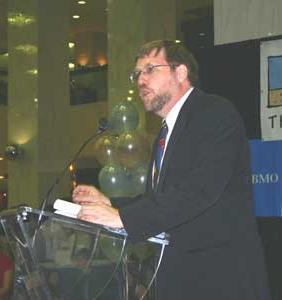The Mesh Conference opened in Toronto yesterday – and it delivered everything that attendees had been hoping for. Thoughtful presentations and discussions by notable speakers. And lots of attendee participation in the discussion and interaction between sessions.
Noteworthy:
- “Reflecting on the abundance of information being added to social media everyday: When information is free, context is more valuiable. People are looking for what it means. People confuse writing opinion with writing for context.”
- It’s tough to malke a living off adwords. We need a new advertising paradigm. CPM doesn’t make sense on blogs. The advertising is seriously lagging in its approach to blogs.
- At a certain point, most bloggers will ask, “what am I getting out of this?” And at that point, most will begin to look for a financial return on their efforts.
- The story never ends. Mainstream Media does not always have the space to update stories; as a blogger, I can always update the story. (Canadian journalist and blogger Mark Evans pointed out that he is able to provide more context in his blog than his is able to do in his newspaper stories.)
- “Web 2.0 is not a technology; it’s a way of thinking.”
- Michael opened his presentation with a series of slides showing the cascading effect of his blog postings about a perceived conflict of interest between the Canadian Recording Industry Association, the Canadian Motion Picture Association and other advocates of a Digital Rights Management-based copyright regime and Member of Parliament Sam Bulte, then-Parliamentary Secretary to Canada’s Minister of Canadian Heritage. These groups hosted a fundraiser for Bulte just four days prior to the 2006 Canadian election. Geist’s posts that the industry’s fundraising for Bulte suggested a too cozy relationship between a senior policy maker and a group advocating a policy position became viral in the blogosphere and broke through into mainstream media coverage. Bulte, running for re-election in a seemingly safe Liberal seat, was defeated. The controversy that enveloped Bulte as a consequence of Geist’s postings played a part in her electoral demise. (I must confess, I don’t totally agree with Michael Geist’s positions on the substance of copyright reform. However, I applaud his integrity and courage in making his point.)
- Geist expects that the newly-elected Conservative government will introduce new copyright legislation this autumn. Ironically, he thinks that backers of copyright reform may actually look back wistfully at the copyright legislation introduced by Bulte and the then-Liberal government. He believes the Conservatives are tilting toward the DRM-based regime advocated by the recording and movie industries.
- “DRM-based policies are failing Canadians. … Some of these reforms aren’t about copyright; they’re about market control.”
- “What is more longtail than Canadian content?”
Two excellent presentations to kick off Mesh.

 Chris is right in his assessment of the important role played in his recruitment by
Chris is right in his assessment of the important role played in his recruitment by 
